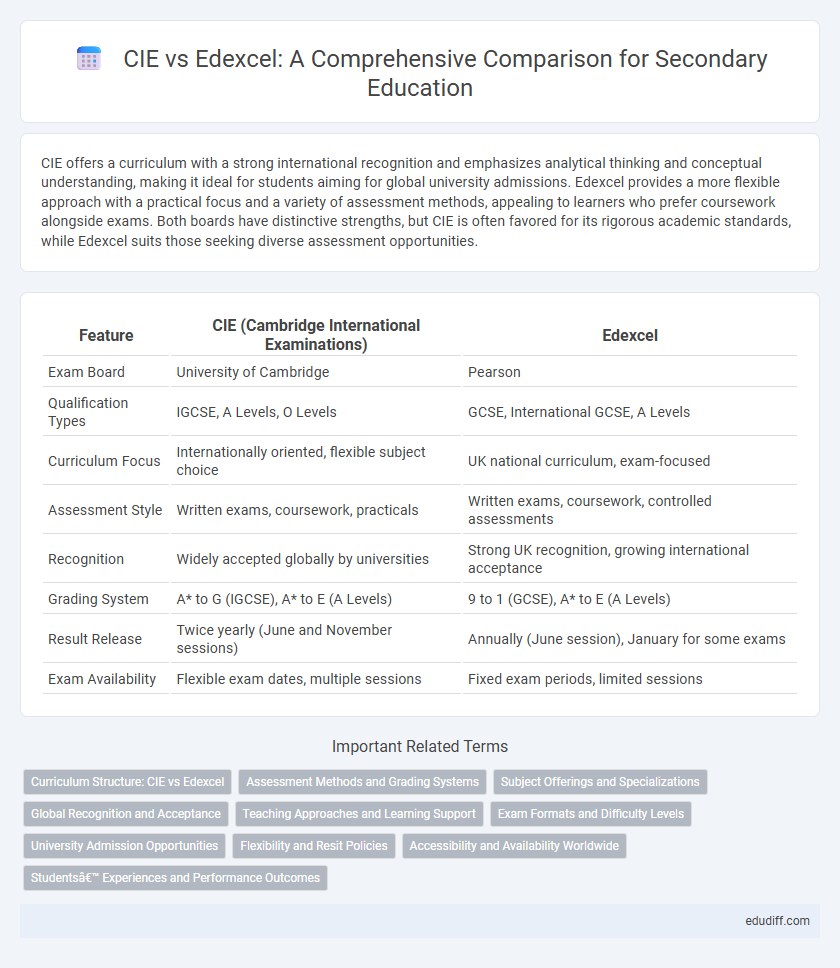CIE offers a curriculum with a strong international recognition and emphasizes analytical thinking and conceptual understanding, making it ideal for students aiming for global university admissions. Edexcel provides a more flexible approach with a practical focus and a variety of assessment methods, appealing to learners who prefer coursework alongside exams. Both boards have distinctive strengths, but CIE is often favored for its rigorous academic standards, while Edexcel suits those seeking diverse assessment opportunities.
Table of Comparison
| Feature | CIE (Cambridge International Examinations) | Edexcel |
|---|---|---|
| Exam Board | University of Cambridge | Pearson |
| Qualification Types | IGCSE, A Levels, O Levels | GCSE, International GCSE, A Levels |
| Curriculum Focus | Internationally oriented, flexible subject choice | UK national curriculum, exam-focused |
| Assessment Style | Written exams, coursework, practicals | Written exams, coursework, controlled assessments |
| Recognition | Widely accepted globally by universities | Strong UK recognition, growing international acceptance |
| Grading System | A* to G (IGCSE), A* to E (A Levels) | 9 to 1 (GCSE), A* to E (A Levels) |
| Result Release | Twice yearly (June and November sessions) | Annually (June session), January for some exams |
| Exam Availability | Flexible exam dates, multiple sessions | Fixed exam periods, limited sessions |
Curriculum Structure: CIE vs Edexcel
CIE (Cambridge International Examinations) offers an internationally-focused curriculum emphasizing in-depth subject knowledge and analytical skills, structured across IGCSE, O Level, AS, and A Levels with flexible subject choices. Edexcel, a UK-based exam board, provides a more modular curriculum with a strong emphasis on coursework and vocational qualifications alongside IGCSE and A Levels, catering to both academic and practical learning pathways. The key difference lies in CIE's global orientation and depth, while Edexcel balances traditional academic rigor with practical assessment components.
Assessment Methods and Grading Systems
CIE employs a combination of coursework, practical exams, and written assessments to evaluate student performance, with grades ranging from A* to E. Edexcel utilizes modular exams and controlled assessments, offering a grading scale from 9 to 1 for GCSEs and A* to E for A-levels. Both boards emphasize rigorous assessment criteria but differ in their use of coursework and modular testing formats.
Subject Offerings and Specializations
CIE offers a broader range of subjects, including unique options like Global Perspectives and Cambridge International AS Level courses, catering to diverse academic interests and specialized fields. Edexcel focuses heavily on vocational and applied subjects alongside traditional academics, with specialties in business, engineering, and health sciences, appealing to students seeking practical skills. Both boards provide rigorous curricula, but CIE emphasizes academic depth while Edexcel balances theory with vocational relevance.
Global Recognition and Acceptance
CIE (Cambridge International Examinations) and Edexcel are both globally recognized examination boards offering qualifications accepted by universities and employers worldwide. CIE qualifications, such as IGCSEs and A-Levels, are widely accepted across Commonwealth countries and prestigious institutions, while Edexcel qualifications have strong recognition in the UK and extensive acceptance in international education systems. Both boards maintain rigorous academic standards, ensuring global acceptance and facilitating smooth progression to higher education institutions.
Teaching Approaches and Learning Support
CIE emphasizes a learner-centered teaching approach with a strong focus on developing critical thinking and analytical skills through inquiry-based learning. Edexcel offers structured lesson plans and extensive learning resources designed to support differentiated instruction, catering to diverse student needs. Both exam boards provide comprehensive teacher training and digital platforms to enhance classroom engagement and learning support.
Exam Formats and Difficulty Levels
CIE exams typically feature a variety of question types including short answers, structured questions, and essays, emphasizing analytical skills and application of knowledge, which can make them more challenging for some students. Edexcel exams often incorporate multiple-choice and structured questions designed for clear, straightforward assessment that may be perceived as less difficult. Differences in exam formats influence student performance, with CIE often requiring deeper understanding and critical thinking compared to Edexcel's more focused approach.
University Admission Opportunities
CIE qualifications are widely recognized by universities around the world, particularly in the UK, giving students diverse admission opportunities. Edexcel qualifications also hold strong acceptance in many global institutions but tend to be more popular in countries like the UK, Canada, and Australia. Both exam boards offer rigorous assessments that prepare students well for university-level study, though specific course recognition may vary by institution.
Flexibility and Resit Policies
CIE offers greater flexibility in exam scheduling with multiple assessment sessions throughout the year, allowing students to choose exam dates that suit their personal timetables. Edexcel provides a more fixed examination schedule but allows resits in specific exam windows, supporting students who need to improve their grades without waiting an entire academic year. Both boards have clear resit policies, but CIE's modular structure enables retakes of individual units, enhancing opportunities for incremental progress.
Accessibility and Availability Worldwide
CIE exams are widely recognized in over 150 countries, providing extensive accessibility for international students through numerous authorized centers, while Edexcel offers robust availability primarily in the UK and Commonwealth nations. CIE's flexible scheduling and extensive global network ensure students can access exams in remote locations more easily compared to Edexcel. The global reach of CIE supports a diverse student demographic, enhancing educational opportunities across varying regions.
Students’ Experiences and Performance Outcomes
Students undertaking CIE exams often report a deeper conceptual understanding due to the curriculum's emphasis on analytical thinking and application-based questions, which can lead to higher performance outcomes in subjects like Mathematics and Sciences. Edexcel assessments typically feature a more structured format with clear grading rubrics, providing students with straightforward expectations that many find helpful for exam preparation and consistent results. Performance data suggests that while both exam boards yield strong academic outcomes, CIE students may exhibit greater proficiency in problem-solving skills, whereas Edexcel students excel in exam technique and time management.
CIE vs Edexcel Infographic

 edudiff.com
edudiff.com